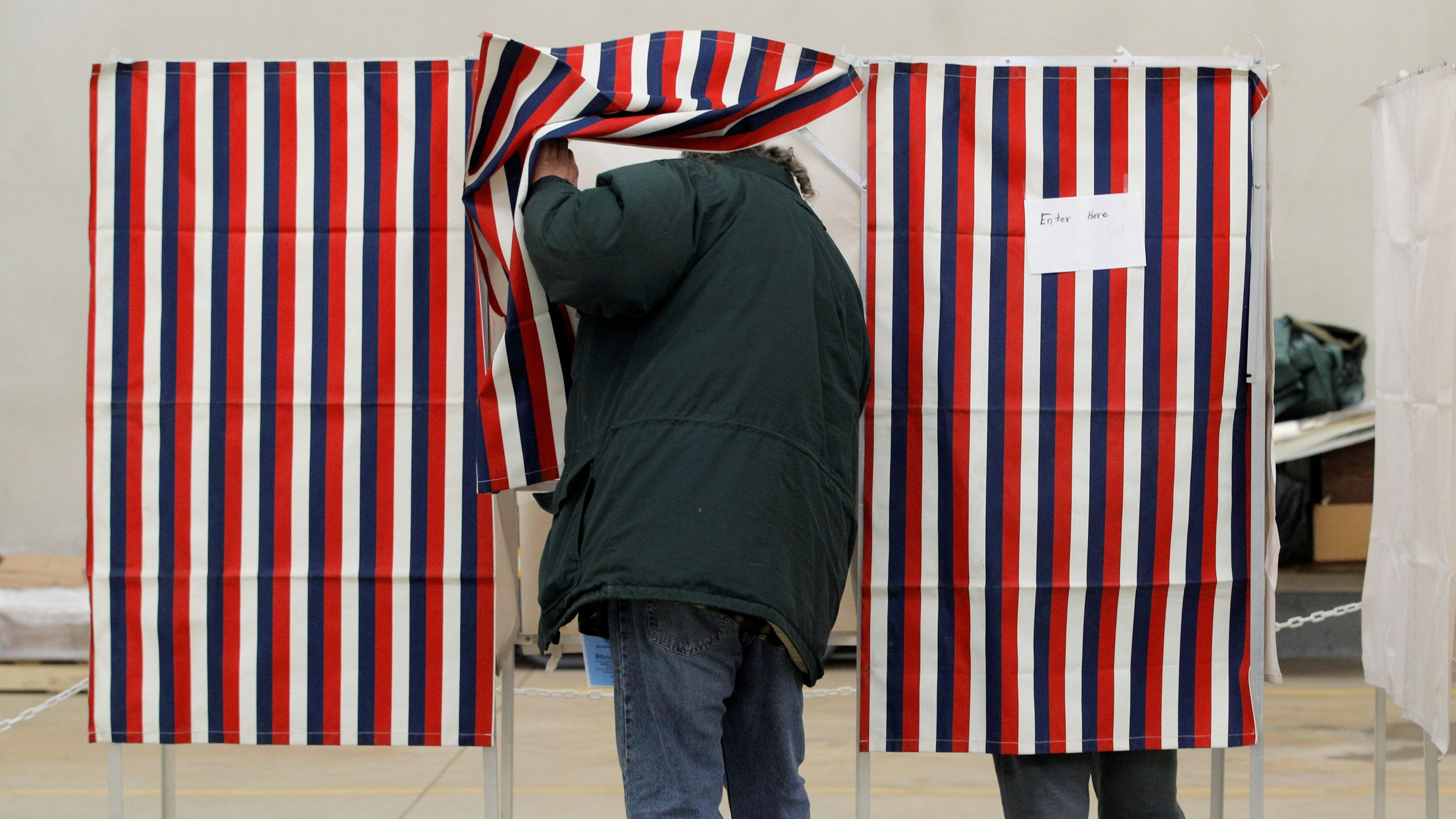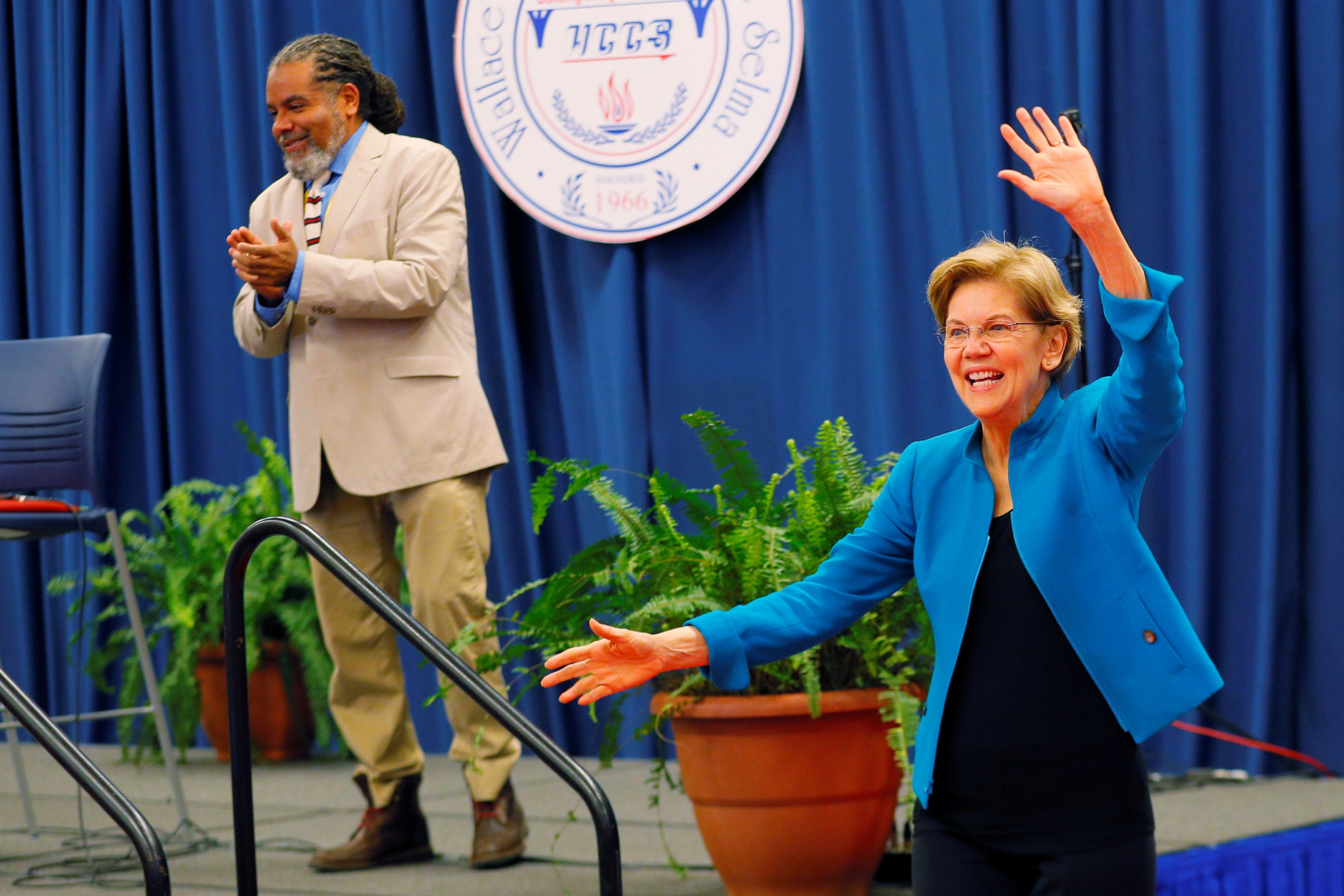
A voting booth in New Hampshire's presidential primary election in Stark, New Hampshire, U.S., February 11, 2020. /Reuters
A voting booth in New Hampshire's presidential primary election in Stark, New Hampshire, U.S., February 11, 2020. /Reuters
Editor's note: Freddie Reidy is a freelance writer based in London. He studied history and history of art at the University of Kent, Canterbury, specializing in Russian history and international politics. The article reflects the author's views, and not necessarily those of CGTN.
In the early hours of November 9, 2016, it was announced that Hillary Clinton would not be making her concession speech until later that morning. In many ways, the Democratic stage has been left vacant ever since.
As the Democratic pack thins and former Vice-President Joe Biden's candidacy chances increase, the point raised by former candidate Andrew Yang remains: "The Democratic Party, unfortunately, is acting like Donald Trump is the cause of all our problems." So why is it that the new front-runner is emblematic of the current problem facing the Democrats in 2020?
One can't help but feel a degree of déjà vu. We feel like this because we have been here before. Of the remaining heavyweights, Elizabeth Warren is a candidate who has been flirting with a run for quite some time but was kept out by Hillary Clinton's somewhat similar ticket proposition in 2016. Then there is Bernie Sanders, the socialist maverick who has re-heated his 2016 campaign and finally, former Vice-President Joe Biden, a veteran of two failed candidacy bids.
Three historic failures have framed the 2020 nomination race.
First, Barack Obama's "Yes we can" message never quite developed into "yes we did." Joe Biden is emblematic of a hope and aspiration that never quite came to fruition and which to those on the left seems like a distant dream. Biden's campaign is as much built on nostalgia, as it is on a genuine belief that he can deliver an American vision the center-left craves.
Second, Bernie Sanders' defeat to Hillary Clinton. The battle between Sanders and Clinton was brutal and wasn't concluded with a wholesale endorsement of Clinton. Sanders' socialist vision lived on and has continued to divide the party. As Michael Bloomberg eluded to, how can the candidate who was defeated by Hillary, somehow better her and defeat the incumbent President with socialist economic policies, at a time when America's economy is going through something of a renaissance?

Democratic presidential candidate Elizabeth Warren arrives to speak at the Presidential Candidate Forum in Selma, Alabama, U.S., March 1, 2020. /Reuters
Democratic presidential candidate Elizabeth Warren arrives to speak at the Presidential Candidate Forum in Selma, Alabama, U.S., March 1, 2020. /Reuters
As Biden's campaign was starting to falter, shockwaves were sent through the Democratic party as the prospect of Sanders winning the nomination increased. This had prompted Bloomberg to enter the race as a "Biden replacement." While Bloomberg's campaign failed, it does seem to have jump started the Biden election machine. A phalanx maneuverer by other former candidates Amy Klobuchar, Pete Buttigieg and Beto O'Rourke on Tuesday was also designed to shut down the internal party debate; followed by Bloomberg concluding his candidacy and endorsing Biden on Wednesday.
This brings up the third failure, the big one. Hillary Clinton in 2016. Many voters today may think, "who cares about Hillary, she's old news." However, most Democratic voters are still reeling from that defeat. The defeat left a generation of disaffected voters who can't come to terms with how they lost and why.
Part of the reason why this has been so hard to resolve, is that the response was reactionary. The party machine instantly pursued a campaign aimed at impeaching President Trump. This took years to bring about and was thrown out by the Senate with little ceremony and appeared a purely partisan move with little to no consequence and a lot of spent capital.
The other factor is that Hillary also struggled to come to terms with defeat. Her book stuck closely to her rationale of Russian interference, endemic sexism, among other reasons. This prevented her from transitioning to an "elder statesman" figure and allowing the party to heal with some honest humility and reflection on the real causes.
Fast forward to the 2020 race and we are in much the same position. President Trump is an iconoclast and the Democratic party has not successfully articulated an engaging counterargument.
Andrew Yang was correct when stating that "when we are talking about him. We are losing."
Fundamentally, the Clinton campaign was inhibited by running a "Stronger Together" message against a much more tangible hope agenda of "Make America Great Again." "Stronger Together" was a reaction to Trump's rhetoric in the same way that the Democrat policy has so far been "anything but Trump."
The question for Biden or Sanders must be, why did Trump win? And how can we make America great again?
The internal schism within the Democratic party may be heading into its concluding phase but the battle for American votes is just beginning. The fresh faces of Yang, Buttigieg and Klobuchar have now gone, and the Democrats are left with two septuagenarians who have been there, got the t-shirts and are still wearing them. Can Democrats in all consciousness therefore, dare to hope for a different result in 2020?
(If you want to contribute and have specific expertise, please contact us at opinions@cgtn.com.)